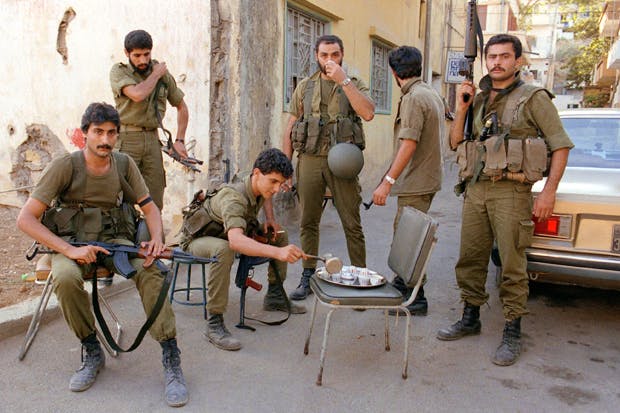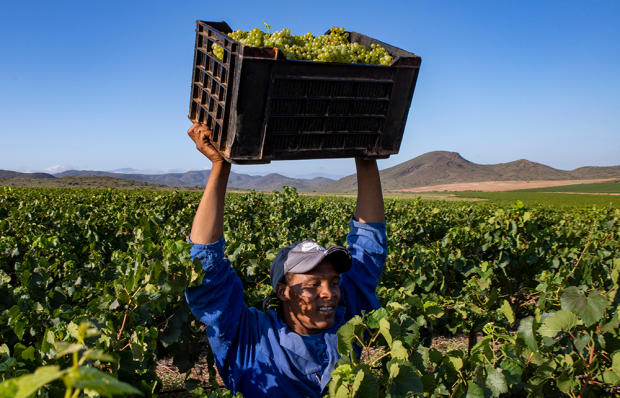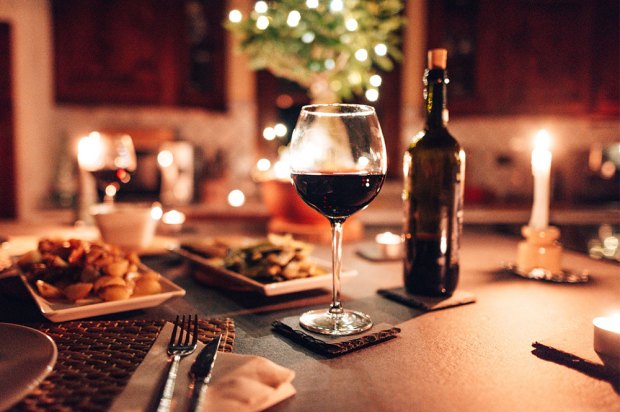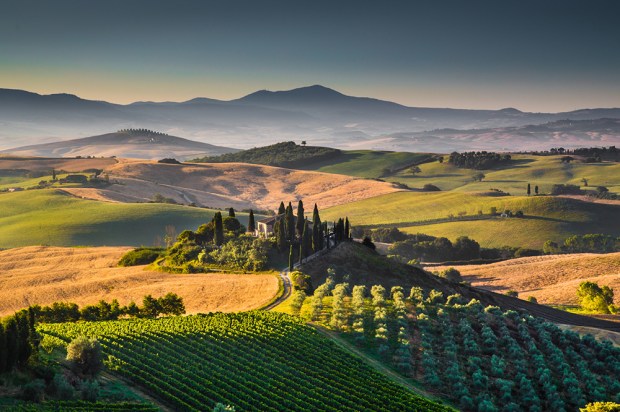Housman had a point. If men could be drunk for ever, the human condition would be tolerable. But thought always forces its way on to the agenda. ‘And when men think, they fasten/ Their hands upon their hearts.’ This occurred to me in the context of Lebanon. That is a country designed to be a paradise where the nymphs dance to Pan’s pipes. An Arabic-French cultural coalition, modern Lebanon should be an entrancing amalgam of sophistication, religious influences and sensuous delights. Lapped by the Mediterranean, it could draw on 5,000 years of that great sea’s civilisation. There is also the landscape and the climate. For much of the year, you can ski in the morning and swim in the afternoon. All Lebanon needs is peace. ‘Give us peace in our time’ — but God seems deaf to entreaty.
Before the troubles started, Lebanon’s charms had a significant influence on British foreign policy. The Israelis and their friends have often accused the Foreign Office of being the Camel Corps: instinctively pro-Arab. Camels had little to do with it. Lebanon did. In the Fifties and Sixties, aspirant Arabist diplomats studied at the Middle East Centre for Arabic Studies, in Beirut. Coming from austere post-war Britain and the sexual deprivation of overwhelmingly male Oxbridge, they discovered girls, dry martinis and all other ingredients of that delicious Lebanese cocktail, douceur de vie. In later years, struggling with the sterility of peace plans and the inevitability of intransigence, is it any wonder that truant thoughts would sometimes escape back to the days of youth? Remembrance of joys past could be a potent source of bias.
In 1989, I was on a three-day visit to Lebanon that suddenly went pear-shaped. My host, General Michel Aoun, a leader of the Maronite Christians, had decided to eradicate his principal opponent, a fellow called Samir Geagea. On the face of it, that was a good idea. I have never met anyone more deserving of eradication. But it was a nuisance for the general’s guests — three days became two weeks — and his planning was deficient. He believed that he could win simply by lobbing shells at Geagea’s positions. The Aounites merely inflicted further architectural destruction in a city that had already been bashed about, further political damage on Maronite Lebanon, also already bashed about, and further blows against the enfeebled structures of the Lebanese state.
On the first night, we had a banquet. Lebanese cuisine is best enjoyed in country, where atmosphere lends enchantment, for it rarely rises above the level of good peasant cooking. I am not persuaded by raw lamb’s liver; it needs at least 45 seconds under the grill. Equally, lambs’ testicles have little flavour: not a patch on bulls’ balls. Lambs’ balls belong minced in a kebab. But at a table heaped with mezze and bottles, criticism would have been carping. It was also possible to overlook the increasing signs of political tension and military manoeuvrings.
There was one amusing incident. One of our number, wholly Anglo-centric in his culinary tastes, approached the native dishes with trepidation. Then he found something that he liked because it was bland. ‘This is OK: what is it?’ I told him: ‘A cold sheep’s brain in olive oil.’ I have never seen a fork laid down with such a shudder, so much determination. Two nights later, we dined off army rations in the cellars of the presidential palace at Baabda, then largely ruined by shellfire.
In the meantime, I had met a dashing young leader called Dany Chamoun, a scion of one of the Maronites’ ruling families. Although it is easy to overinterpret memories in retrospect, I believe I did fear from the outset that this new friend’s princely courage would lead him into the jaws of danger. Like Aragorn, he had chosen to take the paths of the dead. Unlike Aragorn, Dany could not overawe the oath-breakers. A few weeks later, he and his wife were murdered by Syrian agents, as were their two sons, aged four and six. The boys tried to escape by darting under a bed. It availed them naught. One baby daughter survived, because a servant hid her in the laundry room.
In 1989, there was another stylish young Maronite called Sami Ghosn, living in Los Angeles. His parents had decided to create a new life away from the conflict. It seemed to be working. Young Sami had a girlfriend, a convertible, a condo and a job as an architect. Then came the Chamoun murders. They had been Sami’s friends. He felt compelled to honour their memory by committing himself to his country. So he drove to the airport, bought a one-way ticket to Beirut and handed in his green card to the immigration authorities. The Ghosn family owned some land in the Bekaa valley. Sami’s uncles had come close to selling it for next to nothing. He turned it into a vineyard.
Wine has been grown in Lebanon for millennia. Through the decades of war and death, wine-making continued. The late Bron Waugh helped publicise Chateau Musar, which became a source of jokes: the ’98 has a hint of barbed-wire, you pick up the cordite on the nose of the ’99, and so on. But Musar is not the only Lebanese wine (nor quite as good as Bron claimed).
The other day, I went to a tasting organised by Michael Karam, who has written eloquently in this magazine about the region’s sufferings. What he does not know about Lebanese wine is not knowledge. I was especially impressed by a Clos Blanc ’13 from Dom. Wardy, a Comte de M ’10 from Ch. Kefraya and a Fleur de Ka ’06 from Ch. Ka. But Sami took the blue riband. His Terrasses de Baalbek ’10 was superb. There is a triumphant irony. Even amid the splendours of Baalbek, the Temple of Bacchus stands out. It ranks high among the surviving glories of the ancient world. But just beyond the Temple city, there is a Hezbollah encampment. ‘Hezbollah’ means glory of God. Sami’s -terraces overlook the Temple of Bacchus; the feux de joie from Hezbollah are always audible. Gods are worshipped in different ways.
The Lebanese are a resilient people. Whenever there was a ceasefire during Gen Aoun’s failed campaign, children would rush from shelter to sell oranges or gather shell casings for scrap. It is a country which deserves better. We toasted Sami, Michael, the immortal memory of the slain Chamouns and Lebanon itself. We toasted the restoration of Bacchus as Lebanon’s tutelary deity. After enough toasts, hope seems possible. In this case, alas, in vino veritas does not apply.
Got something to add? Join the discussion and comment below.
Get 10 issues for just $10
Subscribe to The Spectator Australia today for the next 10 magazine issues, plus full online access, for just $10.















Comments
Don't miss out
Join the conversation with other Spectator Australia readers. Subscribe to leave a comment.
SUBSCRIBEAlready a subscriber? Log in